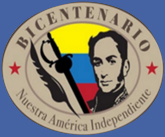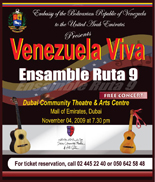
Bolivarian Republic of Venezuela
Embassy in the UAE
Venezuela for kidsPolitical System
Venezuela’s political system is a Constitutional Democracy. The current Venezuelan constitution was adopted in 1999. Important changes were made regarding the structure of the government as well as in human rights and community participation. Since the approval by referendum of this constitution, the government consists of five branches, the Executive, Legislative, Judicial, Citizen and Electoral. The Executive Branch: The President and his cabinet. The President is elected by universal, direct and secret ballot for a six-year term. The President may be re-elected for one additional consecutive term only. Legislative: One chamber National Assembly composed by 165 deputies elected for a five- year term. Deputies may be re-elected for up to one additional consecutive term. Judiciary: The new constitution renamed the Supreme Court as the Supreme Tribunal of Justice. Justices are nominated by the civil society. Final appointment requires the approval of at least two thirds of the legislative branch. The Citizens Branch: Created to safeguard public ethics, to ensure respect for the principle of legality in the Administration, and to assume the defense of human rights. The Ombudsman or Defender of the People, the Attorney General and the Comptroller General form this power The Electoral Branch: This authority is independent from other Government Branches and is appointed by nominations from the civil society. Administrative Division: 22 states, 1 federal district and the federal dependencies. State Governors are elected for a four-year term and may be re-elected for one additional consecutive term only. States: Amazonas, Anzoátegui, Apure, Aragua, Barinas, Bolívar, Carabobo, Cojedes, Delta Amacuro, Falcón, Guárico, Lara, Mérida, Miranda, Monagas, Nueva Esparta, Portuguesa, Sucre, Táchira, Trujillo, Yaracuy, Zulia. (The federal dependencies consist of 11 federally controlled island group with a total of 72 individual islands). Most Venezuelans are Roman Catholic. The Constitution guarantees freedom of religion. All faiths have churches and people may worship freely. Venezuela’s people result from the mingling of European, Amerindian, and African cultures. Traditionally a haven for people of all origins, Venezuela received large waves of immigrants from Europe following World War II and from other Latin American and Caribbean nations during the 1970s. |








